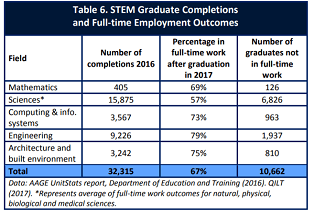Technology is rapidly transforming the world of work. Traditional curricula in tertiary education institutions must change with the times to better prepare graduates for the technologies they will need to utilize once they enter the workforce. Likewise, students are wondering what roles they might have post-graduation, as the job landscape is continually evolving with automation.
Australia’s Institute Centre for Future Work agrees that students might enter roles that their degrees have not prepared them for. They conduct economic research on work, employment, and labor markets, and believe that educational institutions need to begin evolving their offerings to cater to the skills of the future within the majority of industries.

“Individuals with university degrees are more likely to be employed, to have more stable jobs, and to be paid more,” they stated in their report.
“But this relative advantage enjoyed by university graduates does not negate the fact that employment conditions have become much more challenging even for graduates. Rates of graduate employment in full-time work are down significantly over the past decade, and there is evidence of a growing mismatch and underutilization of university graduates in positions that do not fully or even partly utilize their hard-won knowledge and skills.”
Prospective engineers are, therefore, being encouraged to step out into cross-disciplinary avenues of the engineering world to make themselves as attractive to the workforce as possible. As a result, recent graduate engineers report that obtaining first-time employment has been swift.
Quality Indicators for Learning and Teaching (QUILT) provides prospective students with relevant and transparent information about Australian higher education institutions from the perspective of recent students and graduates. They reported in 2016 that 83.1% of engineering graduates found work in the first four months after graduation.
In 2017, QILT conducted further research and found that engineering graduates were the highest in demand in STEM (science, technology, engineering, and mathematics) industries. They found that 79% percent of engineering graduates surveyed had successfully found full-time employment.
Worryingly, in Australia, the sciences (natural, physical, biological, and medical) had the highest number of graduates but had the lowest percentage of graduates in full-time work at only 57%.
Australia Institute’s Center for Future Work says that in their findings, generalist degrees are becoming less useful in the world of work in the future. They do note, however, that the literacy skills attained from those kinds of courses are beneficial in a world of engineering expansion where smart machines and artificial intelligence are replacing menial tasks, and demanding more creative output from the employee.
“In an age of disruption and growing demand for critical, abstract and human-led inquiry, the knowledge acquired through university degrees will be crucial to the future economy,” they state.
“In Australia, degrees have an enduring and growing importance as job market entry qualifications; 32% of all jobs worked in May 2018 required a bachelor’s degree or higher qualification, and this share is projected to increase by one percentage point to 33% of all jobs by 2023.”
 Source: Australia Institute Center for Future Work
Source: Australia Institute Center for Future Work
Globalization and digitization are warping the industries of education and training, and the world of work. The Engineering Institute of Technology’s programs are designed by an international body of industry experts, ensuring students graduate with cutting-edge skills that are valued by employers around the world. The program content remains current with rapidly changing technology to best prepare students for the workplace.
We offer industry-focused short courses and accredited diplomas, bachelor’s, and master’s degrees related to specific engineering fields, one of which is industrial automation. Our industrial automation programs marry electrical engineering with mechanical engineering and aim to prepare students for the jobs of the future.
Our short courses, called Professional Certificates of Competency, are designed to upskill engineers who already work within the industry. We provide professional development in specific areas, so they can further enhance their skills and continuing learning throughout their careers.
Our diplomas and advanced diplomas are vocational programs that deliver practical knowledge and aim to enhance the skills of people who come from a trade background and want to progress their career. Our degrees are designed to give our students both theoretical and practical knowledge required to enter the engineering world. Like all Australian higher education providers and universities, EIT programs are accredited by the exacting standards of the Australian Government’s Tertiary Education Quality and Standards Agency (TEQSA). Many of our degrees are recognized under international engineering accords.
Our unique online delivery model is designed to allow students to study from anywhere in the world while balancing life and work commitments. It makes use of live and interactive tutorials, an international pool of expert lecturers, dedicated learning support officers, and state-of-the-art technologies such as hands-on workshops, remote laboratories, and simulation software. Our supportive blended learning model and small class sizes encourage our students to advance their technical knowledge and remain engaged in their studies while forming global networks
Future and current engineers can be confident in the fact that the industry will continue to grow, but they must also be cognizant that they might end up a field they were never expecting to be in. That reality is beginning to define the future of work.
Works Cited
Pennington, Alison, and Jim Stanford. “The Future of Work for Australian Graduates.” APO, Centre for Future Work, 22 Oct. 2019, apo.org.au/node/264441?utm_source=APO-feed&utm_medium=RSS&utm_campaign=rss-research.
Winsor, John. “The Future Of Work Will Be Uniquely Human.” Forbes, Forbes Magazine, 23 Oct. 2019, www.forbes.com/sites/johnwinsor/2019/10/21/the-future-of-work-will-be-uniquely-human/#73a1a96416b7.
“The University Degrees You SHOULDN'T Be Doing If You Want to Get a Job in Australia after Graduation.” Daily Mail Online, Associated Newspapers, 22 Oct. 2019, www.dailymail.co.uk/news/article-7600247/The-university-degrees-SHOULDNT-doing-want-job-Australia-graduation.html.
